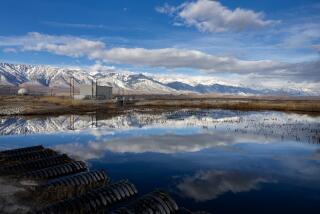The Problem Hasn’t Evaporated : * So Why Regard the Shortage as Water Under the Bridge?
The Los Angeles City Council votes today on Mayor Tom Bradley’s plan to require water conservation. Southern California’s recent stellar performance in voluntarily cutting back on water use makes it tempting to adopt a wait-and-see attitude towards stricter measures. But there are good reasons to approve the plan:
--Water consumers are fair-weather conservationists. June was an exceptionally frugal month, but last February, Angelenos used more water than usual. City government must try to guarantee conservation, not just hope for it.
--Mandatory conservation is not rationing. When any commodity--and in the Southwest, water is a commodity--is rationed, a fixed quantity is divided among consumers. Once your allotment is used, no more is forthcoming. Mandatory conservation means all households will have sufficient water, but customers who are wasteful will find a surcharge on their water bill.
--Los Angeles’ more environmentally conscious residents have probably decreased their consumption by more than 10%, making even more unfair the behavior of those who don’t cut back. Under a mandatory conservation plan, efficient water users will not be punished, but customers who exercise no restraint will be forced to pay for excessive water.
--Continued publicity is needed to keep customer concern alive. Bradley’s plan would not have “water cops” crawling all over the city sniffing out leaky taps; consumers would continue to control their own water use. But with a formal conservation program in place, the drought would have a higher priority in people’s minds.
--The estimated $1 million-to-$4 million cost of the program is minimal.
Councilman Richard Alatorre’s last-minute proposal that mandatory conservation be approved but not put into effect unless voluntary conservation goals are not met for two consecutive months is on its face reasonable. But it postpones the inevitable. Other California communities have mandatory conservation. Why not a heavy water user like Los Angeles?
More to Read
Sign up for Essential California
The most important California stories and recommendations in your inbox every morning.
You may occasionally receive promotional content from the Los Angeles Times.









